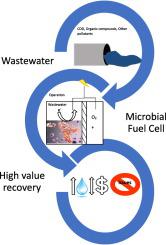Science of the Total Environment ( IF 8.2 ) Pub Date : 2020-09-21 , DOI: 10.1016/j.scitotenv.2020.142429 Carlos Munoz-Cupa , Yulin Hu , Chunbao Xu , Amarjeet Bassi

|
Wastewater treatment is a high-cost and energy-intensive process not only due to large amounts of pollutants but also for the large volumes of water to be treated, which are mainly generated by human activities and different industries. In this regard, biological wastewater treatments have become substitutes to the current technologies, owing to the improved treatment efficiency and added value. Microbial Fuel Cells (MFCs) as one of the promising biological treatments have arisen as a viable solution to Chemical oxygen demand (COD) removal and electricity generation simultaneously. Therefore, in this article, the effects of various operating conditions on the COD removal and power production from MFCs are thoroughly discussed. In addition, the advantages and weakness of current MFCs technologies used for different types of wastewater are summarized. Finally, the technical barriers facing by MFCs operation and the economic feasibility of using MFCs to treat wastewater are provided.
中文翻译:

微生物燃料电池在废水处理,资源回收和能源生产中的应用概述
废水处理是一个高成本,高能耗的过程,这不仅是因为存在大量污染物,而且由于要处理的水量很大,这些水主要是由人类活动和不同行业产生的。在这方面,由于改善的处理效率和附加值,生物废水处理已成为当前技术的替代品。微生物燃料电池(MFCs)作为一种有前途的生物处理方法已成为同时去除化学需氧量(COD)和发电的可行解决方案。因此,在本文中,将详细讨论各种操作条件对MFC的COD去除和发电的影响。此外,总结了目前用于不同类型废水的MFCs技术的优缺点。最后,提供了MFC操作面临的技术障碍以及使用MFC处理废水的经济可行性。











































 京公网安备 11010802027423号
京公网安备 11010802027423号